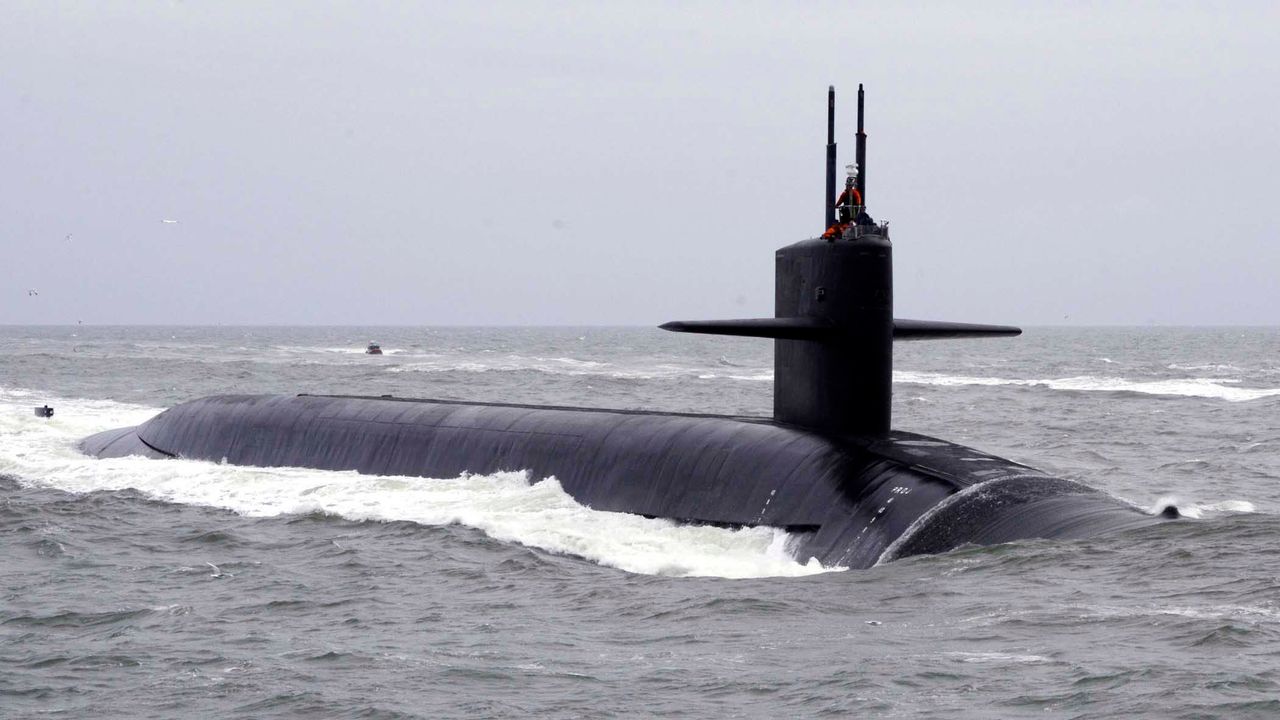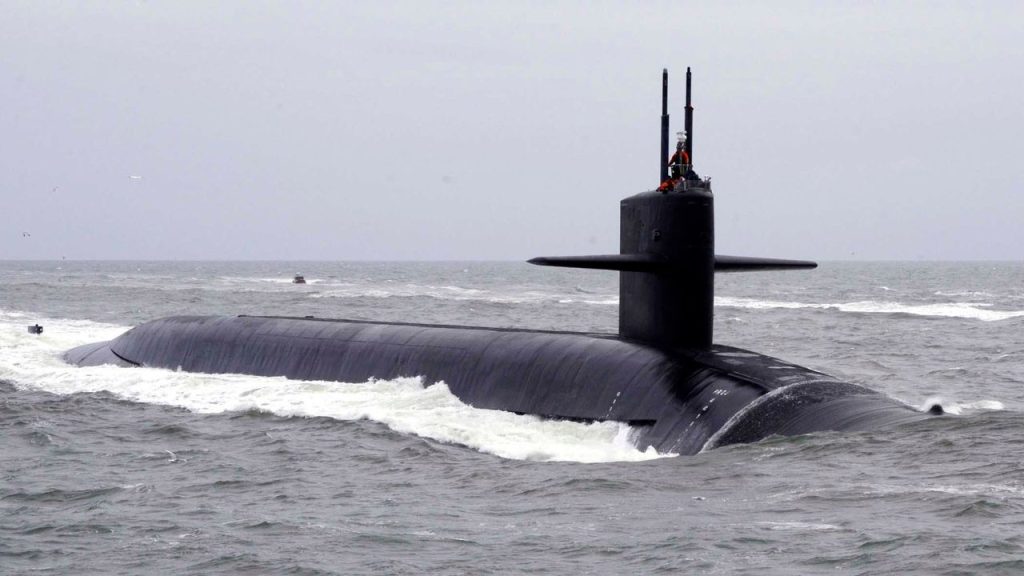
Australian Labor government hails US passage of AUKUS legislation
By Oscar Grenfell
The Australian Labor government has responded with jubilation to the passage of AUKUS legislation by the US Congress last Thursday. The bill enshrines the militarist pact between Australia, the US and the UK, unveiled in 2021, and permits America to sell nuclear-powered submarines to Australia as part of its advanced preparations for war with China.
AUKUS was rolled into the National Defense Authorization Act, which outlines record US military spending of $883 billion for 2024. As the WSWS noted, it is a blueprint for global war, expanding US financing of the Israeli genocide of Palestinians in Gaza, aggression against Middle Eastern states, especially Iran, and support for the proxy war against Russia in Ukraine.

Despite the scale of those unfolding conflicts, a particular focus of the NDAA is aggression against China, which is viewed by American imperialism as the chief threat to its global hegemony. In addition to the nuclear-submarine measure, the NDAA enables an expanded US military presence throughout the Indo-Pacific, the development of AI and high-tech capabilities directed against China and increased aid to Taiwan, among other measures.
The provision to sell nuclear-powered submarines to Australia had been a point of controversy. Senior lawmakers, Democratic and Republican, have warned since the deal was unveiled in March, that the US may not have sufficient industrial capacity to sell the vessels and to replenish its own fleet, given the state of the American industrial base.
The decision to nevertheless press ahead points to a commitment to pursue the conflict with China, whatever the cost. Australia is set to acquire between three and five Virginia Class attack submarines early next decade, before purchasing new jointly-produced vessels later that decade. The total Australian bill could be as high as $368 billion.
Labor’s deputy prime minister and Defence Minister Richard Marles declared that Australians could now “have a sense of confidence about this multi-decade arrangement actually coming to pass.” In fact, the March announcement provoked widespread shock, anger and hostility, combining both anti-war sentiment and demands that the hundreds of billions allocated to the subs be spent on healthcare, education and other social necessities.
Marles said the vote meant: “We are on the precipice of historic reform that will transform our ability to effectively deter, innovate, and operate together.” Defence Industry Minister Pat Conroy told the Australian Broadcasting Corporation the vote was “a momentous day in the alliance with the United States.”
US Democratic Congressman Joe Courtney said the passage of the measures was something that had “never happened before.” Courtney said: “There’s a lot more work to be done in terms of making that a reality, but Congress gave its blessing to allow this very unique and unprecedented step to be taken amongst the three countries.”
The comments point to the far-reaching nature of the agreement. Aside from the immediate issue of the sale of the submarines, the military economies of the US, UK and Australia are being integrated in a way that has not been carried out before.
Australia and the UK are being exempted from general US defence export control requirements and both are being added to Title III of the US Defense Production Act. That section of the act enables the US government to “incentivise” the production of critical and war-related materials from its industrial base, a policy now extended to Britain and Australia.
What is being created recalls both the war economies of the 1930s and the development of blocs, in preparation for conflict.
Behind the rhetoric of “deterrence,” the transparent aim is to prepare an aggressive war against China. That was more or less spelled out by Democratic Senate majority leader Chuck Schumer, who said the AUKUS measures were a “game changer” that would “create a new fleet of nuclear-powered submarines to counter the Chinese Communist party’s threat and influence in the Pacific.”
That has been the central policy of the Labor government since it was elected in May, 2022. Building on more than a decade of military expansion targeting China, it is completing Australia’s transformation into a forward base for active conflict with Beijing and is waging an unrelenting campaign to integrate the region behind US war plans.
The extent to which Labor is an active party in the war drive was underscored by the fact that during an October visit to Washington, Prime Minister Anthony Albanese lobbied Congress for the passage of the AUKUS measures. The legislation has also revealed an Australian commitment to subsidise the US shipyards, on top of the actual purchase of the submarines, to the tune of $A4.5 billion.
Australia’s role as a central US partner and attack dog is not limited to the Indo-Pacific. Last week, the US publicly announced a call out for allies to dispatch warships to the Red Sea, where Yemeni rebel forces have blocked ships from heading to Israel as part of a struggle against the Gaza genocide.
That would be a major step, given the Red Sea is effectively an active war zone. It would take to a new level Australia’s support for the Israeli bombardment of Gaza. Conscious of the dangers and above all, fearful of immense domestic opposition, Labor has not yet given a commitment. Revealingly, Defence Minister Marles has cited as one reason for the hesitance the necessity for the navy to focus “in our immediate region,” as part of the build-up against China.
Meanwhile, Labor last week announced a $186 million funding for expanded Australian involvement in the training of Ukrainian forces in the United Kingdom. That takes Australia’s commitment to the US-NATO proxy war against Russia in Ukraine to well over a billion dollars.
The AUKUS legislation shows that while attention may be focussed on that conflict, as well as the barbaric onslaught against the Palestinians, there is no let-up in the drive to war against China, nor are the preparations of a far-off character, as the deadline for submarine acquisitions may suggest.
A US Navy Virginia-class submarine docked at Sterling Naval base in Western Australia for the first time earlier this year. Those “rotations” are set to be expanded, next year and beyond. From 2027, the Perth facility will begin hosting the US submarines on a “rotational basis,” a codeword for basing, with as many as 700 American military personnel there at any given time. As many as four US submarines would be stationed there, along with one from Britain.
That is part of a broader development of Australia as a vast basing facility. Last year, it was revealed that the Labor government had agreed to the “rotation” of nuclear-capable B-52 bombers in northern Australia. That decision, made without any public discussion or announcement, effectively overturned Australia’s status as a non-nuclear power.
At Australia-US Ministerial Consultations in July, the US basing arrangements were further expanded, across every domain.
These developments are a warning. As the imperialist powers are overseeing the worst war crimes of the century in Gaza, they are preparing conflicts that could rapidly become a nuclear world war. Like the 1930s, capitalism is in crisis, and the response of the ruling elites is aggressive militarism abroad and an assault on the social rights of the working class at home to pay for it.
That underscores the urgent necessity of building an international anti-war movement of the working class, based on a socialist perspective directed against the source of conflict, the capitalist system itself. Such a movement can only be built through an irreconcilable political struggle against Labor and all of its defenders.
[This article was originally published by the WSWS here on December 17, 2023]

